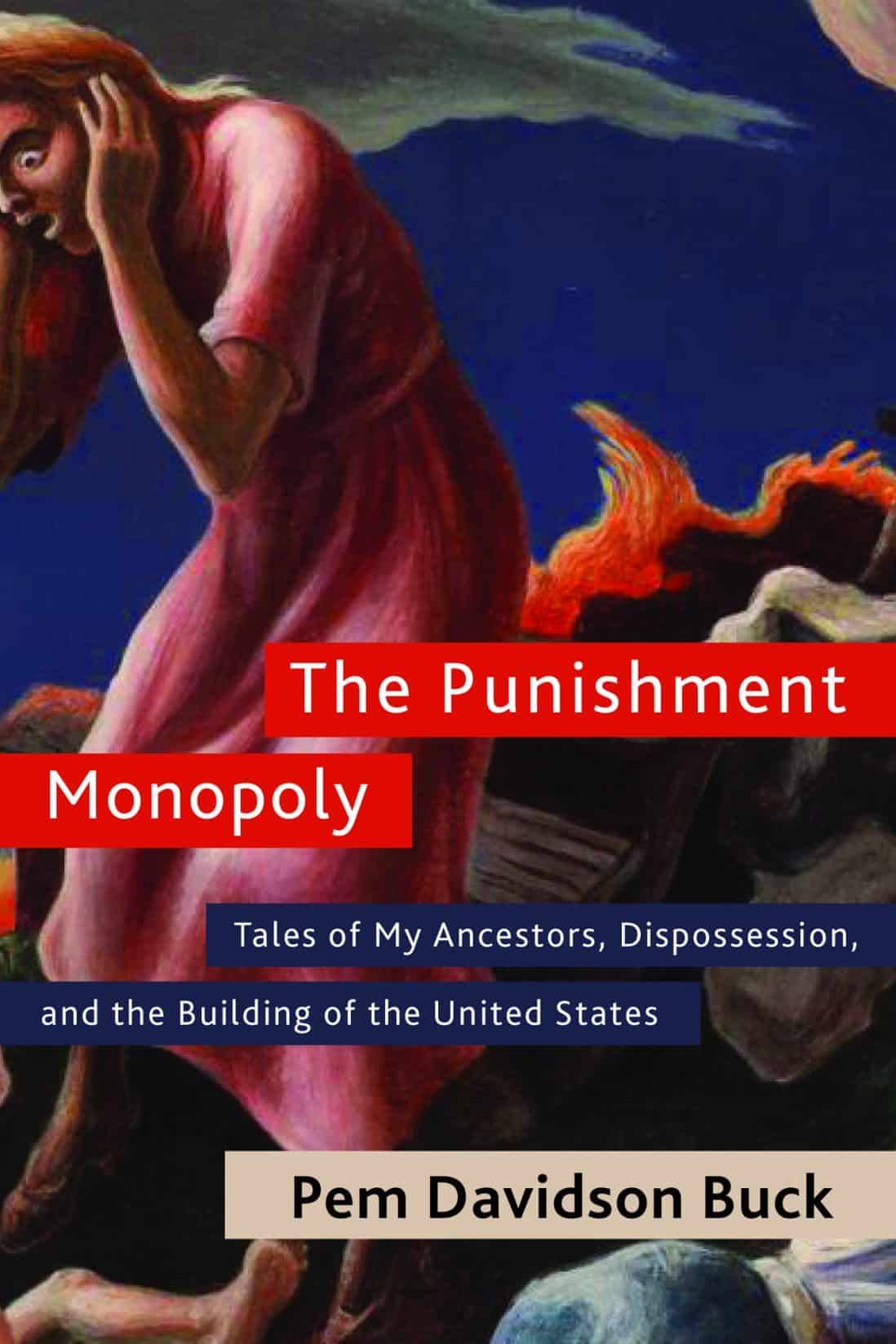The Punishment Monopoly: Tales of My Ancestors, Dispossession, and the Building of the United States
$23.00 – $89.00Price range: $23.00 through $89.00
Why, asks Pem Davidson Buck, is punishment so central to the functioning of the United States, a country proclaiming “liberty and justice for all”? The Punishment Monopoly challenges our everyday understanding of American history, focusing on the constructions of race, class, and gender upon which the United States was built, and which still support racial capitalism and the carceral state. After all, Buck writes, “a state, to be a state, has to punish … bottom line, that is what a state and the force it controls is for.”
Using stories of her European ancestors, who arrived in colonial Virginia in the seventeenth and eighteenth centuries, and following their descendants into the early nineteenth century, Buck shows how struggles over the right to punish, backed by the growing power of the state governed by a white elite, made possible the dispossession of Africans, Native Americans, and poor whites. Those struggles led to the creation of the low-wage working classes that capitalism requires, locked in by a metastasizing white supremacy that Buck’s ancestors, with many others, defined as white, helped establish and manipulate. Examining those foundational struggles illuminates some of the most contentious issues of the twenty-first century: the exploitation and detention of immigrants; mass incarceration as a central institution; Islamophobia; white privilege; judicial and extra-judicial killings of people of color and some poor whites. The Punishment Monopoly makes it clear that none of these injustices was accidental or inevitable; that shifting our state-sanctioned understandings of history is a step toward liberating us from its control of the present.
Through the lens of family members, and those with whom they interacted, Pem Davidson Buck allows the reader to flesh out the structures of domination, inequality, the restrictions of gender, race, religious conflict, warfare, and notions of property present in the British Isles, West Africa, and mainland North America from the seventeenth century through contemporary times. A great book.
—Yvonne Jones, Associate Professor of Anthropology at the University of Louisville
In a reckoning with the past that explains the horrors of the present, anthropologist Pem Buck digs into tales of her ancestors and historical archives to weave an unforgettable story of the rise and reproduction of the family, private property, and the punitive state. The secret global history of the United States revealed in this masterwork is a must-read for knowing the world, then and now.
—Alisse Waterston, author, My Father’s Wars: Migration, Memory, and the Violence of a Century
Through the lens of her settler colonial family history, Pem Davidson Buck tells a story of interwoven experiences of dispossession and the use of force on three continents over five centuries undergirding power relations in the U.S. state. Her efforts to bring equal narrative attention to the experiences of those with dramatically unequal documentation in dominant historical records make this an original and compelling background for vital work in countering deep social, political, and economic injustices in the current U.S.
—Ann Kingsolver, Anthropology Department, University of Kentucky
This book is a major feat in historical interpretation. It un-silences important aspects of the U.S. past and present through its intersectional approach to multicultural contact and interaction; the intricate workings of colonial power continued into the present day; the dehumanizing effects of indenture, genocide, and enslavement in a class and racially stratified social order that came to be organized around white privilege and supremacy, heteropatriarchy, and punishment. Like no other book I’ve read, Buck’s remarkable counter-storytelling brings the insights of an ethnographer and creative writer to her tales about her Scottish ancestors, whose privileges depended on the dispossession, displacement, and enslavement of others. Throughout the history she narrates, from colonial Jamestown to the current-day Fergusons and Standing Rocks, her analysis of statecraft, the power to punish, and ordinary people’s resistance is accessible, theoretically engaging, and methodologically honest.
—Faye V. Harrison, Professor of African American Studies and Anthropology, University of Illinois, Champaign-Urbana; author, Outsider Within: Reworking Anthropology in the Global Age
In the United States, we often assume that social theory of the state—specifically as an entity that has jealously gathered unto itself the power to kill—belongs on the other side of the Atlantic. Pem Buck’s work shows, through a revelatory 400-hundred year historical anthropology of her own family, that the U.S. has its own genealogy of state violence.
—Edward E. Baptist, Cornell University; author, The Half Has Never Been Told: Slavery and the Making of American Capitalism
In an extraordinary combination of state-theory and genealogical analysis, this book exposes the rarely acknowledged relationships between the right to punish and processes of accumulation of capital and dispossession in U.S. history. Pem Buck’s book is an outstanding contribution to political theory, American history, kinship studies, reflexive anthropology, and studies in culture and power.
—Nina Glick Schiller, Emeritus Professor, Social Anthropology, University of Manchester, University of New Hampshire; co-editor, Anthropological Theory
Buck (Elizabethtown Community and Technical College), an anthropologist, has written a provocative, timely, detailed account of the interrelationships of race, class, and gender in the formation of the US from Jamestown to modern times. The text is fundamentally about labor and the various means that propertied classes employed to appropriate land and compel labor from American Indians, indentured servants, and slaves, interwoven throughout with stories of the author’s European ancestors. Early class and status divisions gave way to racial segregation, enforced by complex laws and punishments and by the elites’ manipulating the fear of revolts. Ironically, the biggest revolt of the enslaved came during the American Revolution when thousands of black people joined the British army. After the Civil War, slavery morphed into debt peonage, sharecropping, convict labor, chain gangs, and, more recently, prison industries. Requiring more and more cheap labor to sustain mass production and maintain white privilege, capitalism expanded to extract labor from poor women, children, and immigrants. This is not a traditional American history portraying a relentless march toward freedom. Backed by considerable research, this stimulating account is worth reading, especially in light of unsettling current events.
—P. T. Smith, emeritus, Saint Joseph’s University, CHOICE
Pem Davidson Buck is Professor Emerita of Anthropology at Elizabethtown Community and Technical College in Kentucky. Her work has focused on whiteness, on the discourses of inequality, and most recently on theorizing the carceral state and the relationship between state formation and punishment. She is the author of Worked to the Bone: Race, Class, Power, and Privilege in Kentucky and In/Equality: An Alternative Anthropology.
Publication Date: November 2019
Number of Pages: 384
Paperback ISBN: 978-1-58367-832-9
Cloth ISBN: 978-1-58367-833-6
eBook ISBN: 978-1-58367-834-3
Related products
-
Monthly Review Volume 2, Number 6 (October 1950) [PDF]
$10.00 Add to cart -
Monthly Review Volume 2, Number 5 (September 1950) [PDF]
$10.00 Add to cart -
Monthly Review Volume 2, Number 1 (May 1950) [PDF]
$10.00 Add to cart -
Monthly Review Volume 1, Number 11 (March 1950) [PDF]
$10.00 Add to cart -
Monthly Review Volume 1, Number 4 (August 1949) [PDF]
$10.00 Add to cart -
Imperialism and World Economy
$15.00 Select options This product has multiple variants. The options may be chosen on the product page

![Monthly Review Volume 2, Number 6 (October 1950) [PDF]](https://monthlyreview.org/wp-content/uploads/2015/09/Monthly Review Volume 2, Number 6 (October 1950) [PDF].jpg)
![Monthly Review Volume 2, Number 5 (September 1950) [PDF]](https://monthlyreview.org/wp-content/uploads/2015/09/Monthly Review Volume 2, Number 5 (September 1950) [PDF].jpg)
![Monthly Review Volume 2, Number 1 (May 1950) [PDF]](https://monthlyreview.org/wp-content/uploads/2015/09/Monthly Review Volume 2, Number 1 (May 1950) [PDF].jpg)
![Monthly Review Volume 1, Number 11 (March 1950) [PDF]](https://monthlyreview.org/wp-content/uploads/2015/09/Monthly Review Volume 1, Number 11 (March 1950) [PDF].jpg)
![Monthly Review Volume 1, Number 4 (August 1949) [PDF]](https://monthlyreview.org/wp-content/uploads/2015/09/Monthly Review Volume 1, Number 4 (August 1949) [PDF].jpg)
